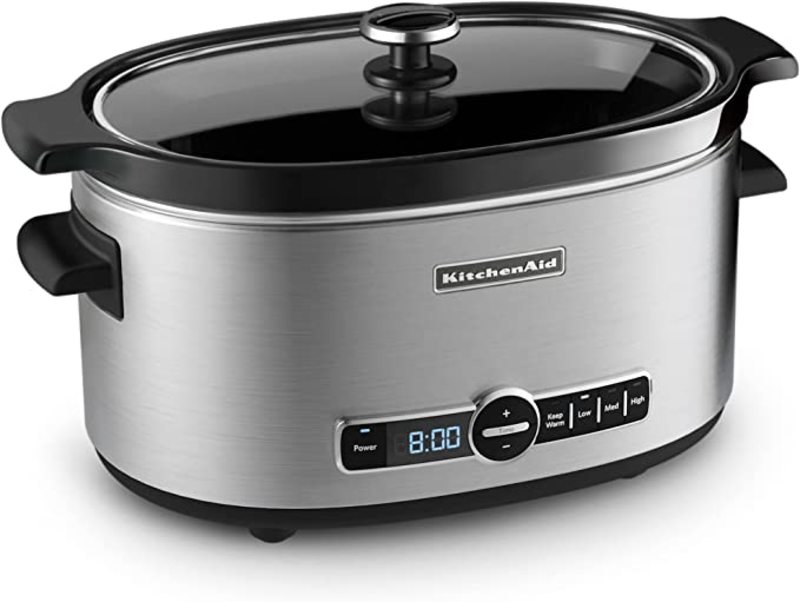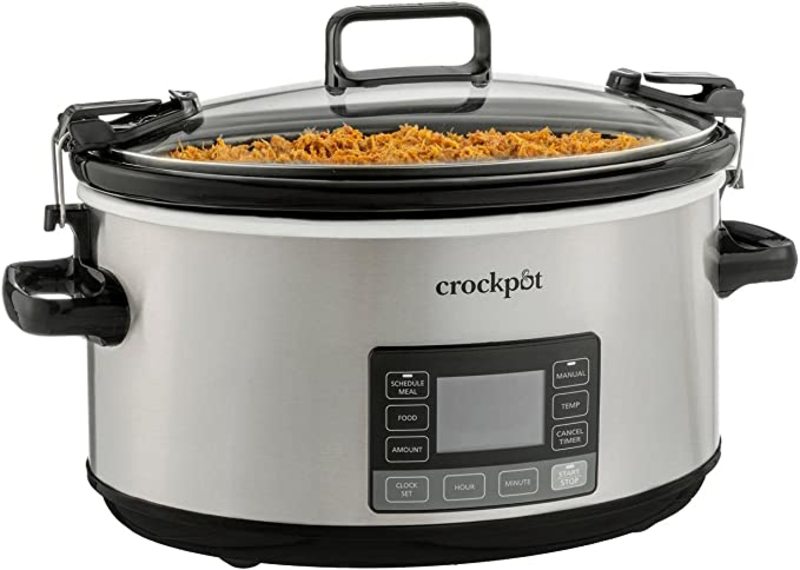The Best Slow Cookers for Your Money
Whether it’s smoking a brisket for 24 hours or leaving a beef stew in the oven while you’re at work, cooking food slowly makes a difference you can taste. Cooking at low temperatures for hours really brings out flavors and preserves nutrients in food. It’s the best way to tenderize even the toughest cuts of meat, and it’s perfect for soups and stews.
Slow cooking is a time-tested method. From burying meat over coals in the sand or soil to using variations of what we now know as a Dutch oven, slow cooking has been around for almost as long as humans have cooked on fire.
Since the popularization of the Crock-Pot in the 1970s, electric slow cookers have filled that role in the American kitchen. The appliance was advertised as a “set it and forget it” option for working people, promising (and most of the time, delivering) a hearty dinner with little effort involved.
Slow cooker buying guide
If you’re on the lookout for a slow cooker, whether it’s for convenience, superior flavor or both, here are some things to consider.
• Capacity. A slow cooker’s internal capacity ranges between 4 and 7 quarts, with 6 quarts being the most common for families. Cookers from 3 to 5 quarts are often meant for singles or couples, or for people who only use slow cookers occasionally for sides and appetizers. On the opposite end, cookers above 8 quarts, even up to 22, are used by people who often cook for parties or have small food businesses.
There are also models that have three individual cookers in one, with three small 1- or 1.5-quart pots so you can cook different foods in each one. These are convenient for cooking different appetizers or preparing full, diverse meals for a few people.
• Versatility and settings. Many slow cookers now come with the ability to do a lot more than cook a stew for eight hours. They can cook rice and sear meat, and some even have an option for sous vide, a technique that slow cooks vacuum-sealed meat in water at a very specific temperature. (Note, however, that most don’t do the latter particularly well.)
What is most important, though, are the settings specific to slow cooking itself. Some slow cookers are very simple — they have a knob with low, high and warm settings, and you have to monitor it yourself.
More advanced models have timers you can program and automatic “keep warm” options to avoid overcooking your food. Others have specific temperature settings so you don’t have to rely on guessing what “low” stands for.
On higher-end models, you can set up two different timers, each with different temperatures for an even more hands-off experience that can accommodate recipe-specific changes.
• Pot and lid. The quality of a slow cooker’s internal removable pot is incredibly important, especially since they vary widely in their ability to distribute or maintain heat. This will largely depend on the pot material, which are most often teflon-coated aluminum, enamel-coated steel, exposed stainless steel or ceramic.
With aluminum or steel, you can use the pot on a stove to brown or sear food. Teflon or enamel coats will be non-stick, and enamel-coated steel will provide even and consistent heat, similar to ceramic. Ceramic itself provides better cooking as it traps heat longer and distributes it throughout the pot at a more consistent pace. Exposed stainless steel isn’t necessarily a champion in heat distribution, but it’s the safest option as there is no risk of harmful toxins like on teflon or concerns of breaking like with ceramic.
When it comes to the lid, it’s important to make sure it has a decent seal (not airtight). Most lids are glass, so they allow you to see inside without opening the cooker and delaying the process. Some models have metal lids that function well but don’t allow you to get a peek inside without removing it.
Another nifty feature to look for is whether the lid has a closing mechanism (clamps or hooks that keep the lid tightly in place) that will allow you to easily move the appliance around or even travel with it. Models with this feature make it easy to bring food to parties, picnics or other outdoor activities.
Slow cooker vs. Instant Pot and other multi-cookers
Nowadays, electric pressure cookers are essentially multi-cookers that also have a slow cooking feature. And since the popularization of the Instant Pot, the slow cooker’s relevance has been put in question. So what makes a dedicated slow cooker worth it?
There are two main factors:
• Price. Slow cookers can be as expensive as $300 to $500, but for the most part, you can find simple, reliable models for $30. Multi-cookers — which all have a slow cook option — can sometimes cost under $50, but they are significantly smaller than slow cookers in the same price range.
• Heat distribution. Most pressure cookers are made from stainless steel and are tall and round. This design, and the fact that they produce heat only from the bottom, can make their heat distribution uneven when cooking at very low temperatures.
On the other hand, the majority of slow cookers have a wide pot made of ceramic or aluminum, which distributes heat better and more evenly. Slow cookers also tend to have a heating mechanism that surrounds the entire pot and heats the entire area simultaneously.
It’s also important to keep in mind that some of the features available on a multi-cooker — like precise temperature control, for example — don’t come into play in the slow cooking mode. You still just get basic low, high and keep warm slow cooking settings ,and a 24-hour timer like on the average $50 slow cooker.
While pressure cooking in an Instant Pot could rival the results of a slow cooker, using its slow cooking setting won’t have the same results. If you have a big batch of dense food, like a pot full of meat and potatoes, the uneven heat distribution could fall short in comparison to a dedicated slow cooker. It could also leave excess water inside due to the airtight lid, even if the steam valve is open.
Best slow cookers
1. Best Overall: Chefman Six-Quart Electric Slow Cooker
Check on Amazon | Check on Walmart
The Chefman Six-Quart Electric Slow Cooker is a secret weapon in any kitchen. If you’re eager to start making effortless and mouthwatering meals, this electric slow cooker can do the trick. It is designed with both culinary convenience and flavor in mind. Plus, this slow cooker is sure to simplify your cooking routine while delivering results that are worth the slow-cooked wait.
Whether you're a busy professional, a home chef, or someone who appreciates the joys of slow-cooked cuisines, this kitchen essential can transform your meal preparation. It boasts a spacious six-quart capacity. That way, you can whip up hearty and delicious dishes for the whole family. You can even invite dinner guests whom you’ll certainly impress.
The user-friendly digital control panel of this slow cooker offers precise temperature settings and programmable timer options. In turn, you’ll have complete control over the cooking process. The "Low and Slow" cooking method unlocks the full depth of flavors as well. From tenderizing meats and infusing rich aromas, it ensures that your dishes turn out perfectly every time.
With its sleek and stylish stainless steel design, this slow cooker not only enhances the aesthetics of kitchens but it also elevates the entire culinary expertise. When you purchase this slow cooker, you can say goodbye to the stress of last-minute meal prep. Instead, you can focus your attention on savoring the satisfaction of home-cooked dishes. Cooking becomes effortless with this product, making it our top choice.
Pros
- Simplifies meal preparation for convenient cooking
- Large six-quart capacity
- Precise control with temperature and timer settings
Cons
- Limited cooking methods
2. Most Long-lasting: Cuisinart MSC-800 7-Quart 4-in-1 Multi-Cooker
Check on Amazon | Check on Walmart
Although the name might imply otherwise, this Cuisinart is, first and foremost, a slow cooker, and although expensive at around $200, it’s pretty much the best there is. It doesn’t have many bells and whistles, just enough to do its job well, and some added conveniences to make cooking easier.
In addition to slow cooking, this model offers roasting and steaming. The one that complements slow cooking the most, though, is the sauté/sear setting of up to 500°. While with most slow cookers, you’d have to sear on the stove and then transfer your food over to the cooker, with the MSC-800, you can sear food in the appliance itself before setting it up to slow cook; that means you only need a single pot and a single appliance for the whole process.
In slow cooking mode, you have high, low, warm and simmer options. While you can’t select specific temperatures, third-party testing shows that the MSC-800 can keep very consistent levels of heat for hours. This consistency is, arguably, the most important feature on a slow cooker. It also has a Keep Warm feature, which will turn on automatically as soon as the cooking time is done.
The pot, made from cast aluminum with a non-stick coating, is dishwasher-safe. You could use it on a stove to sear or brown (although there's no real reason you'd need to). It’s also a spacious 7 quarts, making the MSC-800 versatile not only in cooking style but in the quantity of what you can cook.
Non-stick coatings can deteriorate, though, and even when they’re long-lasting, they’re vulnerable to scratching by metal utensils. If you want a stainless steel pot and more features, you can look at the Instant Pot Aura Pro. It’s less expensive and has more features too, like sous vide and yogurt making; however, its slow cooking quality and consistency are not as good as the Cuisinart.
3. Editor’s pick: KitchenAid KSC6223SS 6-Quart Slow Cooker
Check on Amazon | Check on Walmart
Just like the Cuisinart, this KitchenAid is a simple dedicated slow cooker that consistently delivers quality. It’s also backed by KitchenAid’s solid reputation and a 1-year hassle-free warranty, meaning the company will replace it if it’s defective, no questions asked.
It has a dishwasher-safe 6-quart ceramic pot, which will maintain heat evenly and consistently for hours. The pot is very easy to remove as it has high handles, with plenty of distance from the cooker’s handles. However, note that the prominent handles on the pot could be confused for the cooker’s handles. This could lead to accidents like burning your hand if you grab those instead of the insulated handles.
Unlike some cheaper slow cookers that don’t have a timer or have very limited cooking range, the KitchenAid has a 24-hour timer. This gives a wide range of options for different recipes. It also automatically shifts to Keep Warm mode when the time ends. You can still monitor the food: The countdown is displayed on the digital screen, and the glass lid lets you see the process inside.
Just like most dedicated slow cookers, it doesn’t have specific temperature settings, but this model does add a medium mode (instead of just low and high), which many reviewers appreciate for the added versatility.
4. Best for low prices: Crock-Pot 6-Quart Cook & Carry Slow Cooker
Check on Amazon | Check on Walmart
If you want to save money without sacrificing quality, the slow cooker’s original brand, Crock-Pot, is the way to go. For only around $30, you get a really good 6-quart slow cooker.
This model is simple. It has a manual knob to set the temperature on low, high or warm. The material of the pot isn’t specified, but the company calls it “stoneware,” a generic term used for ceramic cookware. A ceramic pot is great for slow cooking, since ceramic traps heat inside and releases it at a steady pace.
Locking clamps on each side — rare for slow cookers — will keep the lid in place. This is good for transporting the Crock-Pot to picnics or parties, or simply moving it around the kitchen.
Unfortunately, this slow cooker doesn’t have a timer, so you have to either monitor it or be fully aware of the time needed before the recipe is overcooked. For about $15 to $20 more, you can get a nearly identical model, the Crock-Pot Cook & Carry SCCPVL610 (with clamps too) with a timer feature.
More from Money:
The Best Instant Pots and Pressure Cookers for Your Money, According to Food Bloggers
The Best Coffee Makers for Your Money — and Barista Tips for Brewing the Perfect Cup at Home



